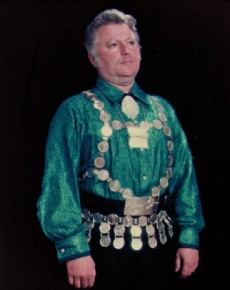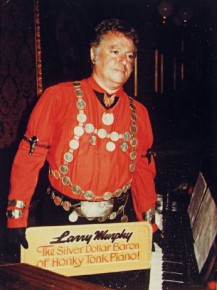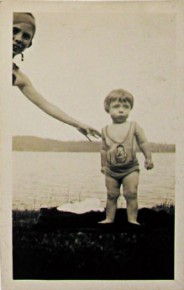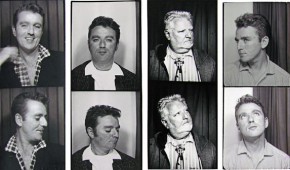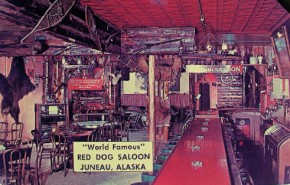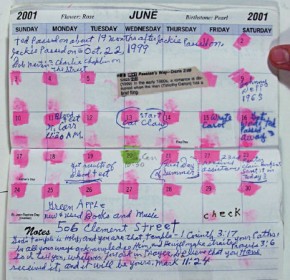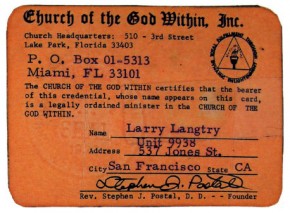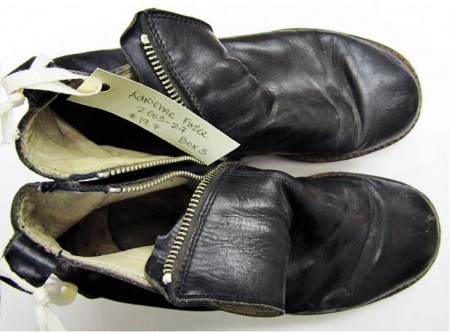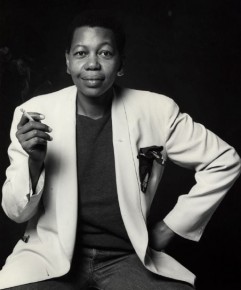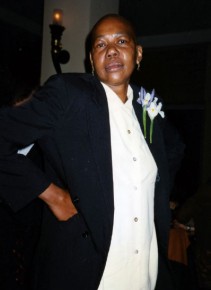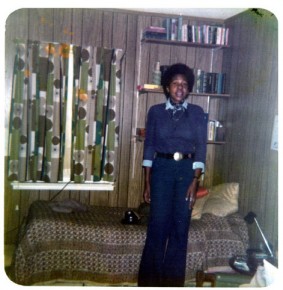 The Gay, Lesbian, Bisexual Transgender Historical Society collects, preserves and interprets the history of GLBT people and the communities that support them. Founded in 1985, the society is recognized internationally as a leader in the field of GLBT public history. It is located in San Francisco, California where a small staff, board of directors and multitude of community volunteers work to fulfill an ambitious mission.
The Gay, Lesbian, Bisexual Transgender Historical Society collects, preserves and interprets the history of GLBT people and the communities that support them. Founded in 1985, the society is recognized internationally as a leader in the field of GLBT public history. It is located in San Francisco, California where a small staff, board of directors and multitude of community volunteers work to fulfill an ambitious mission.
The society’s professionally staffed archives preserve one of the world’s largest collections of GLBT historical materials. This includes approximately 500 collections of personal papers and organizational records, unpublished material such as letters, diaries and scrapbooks documenting the lives of both unknown and public individuals, 200 non-manuscript collections, 70 linear feet of ephemera, 4,000 periodical titles, approximately 80,000 photographs, 3,000 t-shirts, 5,000 posters, nearly 500 oral histories, approximately 2,000 hours of recorded sound, film and video, and extensive holdings of historic textiles, fine and graphic arts, and artifacts.
Museum. The society also sponsors The GLBT History Museum located in San Francisco’s Castro District. The museum features long-term and regularly changing exhibitions as well as public programs. The current exhibit in the main gallery, “Our Vast Queer Past,” offers a kaleidoscopic view of queer experience in San Francisco and the Bay Area over the past 100 years. It incorporates hundreds of artifacts from the archives, including Harvey Milk’s kitchen table, matchbook covers from historical bathhouses and the wedding outfits of a well known activist lesbian couple who were finally able to get married in their late 80’s.
Instead of forming a single narrative, this exhibition Instead brings together multiple stories, sometimes interlinking, sometimes isolated, sometimes in conflict to raise new questions about familiar gay, lesbian, bisexual and transgender histories and evoke previously untold stories that speak eloquently about our diversity. All the stories reflect deeply human themes: the search for companionship and pleasure; the struggle for self-determination and respect in an often-hostile society; the value of individual and collective expression; and the spirit, ingenuity and wit that have been keys to our survival. For more information visit: The Gay, Lesbian, Bisexual Transgender Historical Society
Lawrence DeCeasar (Larry Langtry) - (1931-2002)
The Lawrence DeCeasar papers contain materials related to the life and career of the local ragtime musician also known as Larry Langtry, Silver Dollar Larry and Larry the Pianoman. DeCeasar worked in saloons from New Orleans to Juneau, Alaska. He was active in San Francisco from the 1970s through the 1990s and lived for many years at Maria Manor near San Francisco’s Union Square where he entertained his community with music and tales of his life. Self-taught on a player piano, he had previously worked as a fry cook. DeCeasar was also a certified minister with the Church of God Within and was a spiritualist and metaphysician. The collection includes correspondence, personal and professional photographs, materials related to the Church of God Within and his spiritual life, including his astrological chart, appointment calendars, newspaper clippings, personalia (including materials from his memorial service), sheet music and set lists, and costumes that he wore while performing.
One of Larry DeCaesar's Play Lists
Larry created playlists that were meticulously handwritten in notebooks and on the backs of odd pieces of cardboard. They contained hundreds of showtune titles, mostly pre-1928 tear-jerkers, all of which he could play by heart on request.
Adrienne Fuzee 1950-2003
6 cartons, 1 oversize photograph (7 linear feet) Adrienne Louise Fuzee was born May 16, 1950 in Los Angeles to parents Lawrence and Beulah Fuzee. She graduated from Our Lady of Loretto High School in 1968, then lived and worked in the San Francisco Bay Area throughout her adult life. Her life partner was Lisa Kahaleole Hall. A visionary artist and writer, Adrienne helped develop and promote the work of artists at the Watts Towers, Los Angeles Women’s Building, New Langton Arts, the Spectrum Gallery, Zocolo Gallery, the GLBT Historical Society, Oakland Art Dot Com, the San Francisco LGBT Community Center and her own Galerie Fuzee. Fuzee died on May 18, 2003 in Oakland after a lengthy battle with diabetes.
The Adrienne Fuzee papers document the professional life of one of the few openly lesbian African-American curators working in the U.S. in the late 20th Century. She co-edited “Unsolicited Commentary,” a journal of cultural criticism; taught at the San Francisco Art Institute; co-founded Lesbians in the Visual Arts (LVA); was a founding board member of the Queer Cultural Center (QCC), which produced the National Queer Arts Festival; and was a president and board member of the City of San Francisco Art Commission Gallery Advisory Board. The bulk of the collection consists of Fuzee’s professional papers, writing and artists’ files, which document exhibits she curated and the galleries with whom she worked. They contain correspondence and memos, ephemera, financial records, grants and proposals, news clippings, notes, publicity materials and slides. The collection also contains personalia that includes correspondence, clothing, artifacts and photographs.
Adrienne Fuzee Quotes (From Papers In Archive)
"A cry for sense. An end to nonsense. A call for clear discourse, for simplicity, for clarity. A plea for connectivity. A new beginning. A step beyond what is happening now. Poetry, please! Beauty, please! A blend of inside and outside! Peace! Wholeness! Rapture! Concentration! Purity! The Best! Quote me! Give me a first sentence that will rattle the windows!”
“As a Black Female artist I experience the forces of censorship and repression in ways that are so personally (intimate) internalized that for me to participate in a discussion of censorship requires a monumental effort… The artistic/ personal/spiritual/cultural/ history contained in me, struggling to be free, now is restrained by chains that shackled me and my ancestors. Censorship is not an orphan – its father is power, its mother is religion, its siblings are repression, silence and denial, all existing in a dynamic of dysfunction that recognizes my essential otherness and requires me to smother my self so that I may receive their “love” and be accepted. (from notes for LVA panel on censorship)”
“In post-modern art, issues have come to the fore that are antithetical to the purist modern art canon: messy explorations of class, race, gender and sexual identity are “acceptable” topics today. Perhaps out of a deep seated sense of ennui… art academicians and theorists have begun to examine, appreciate and extol the vigorous and passionate art being produced by “marginalized” members of the art community. (Gay men in particular have reaped financial and critical awards for their work.) Somehow lost in all this clamor and acclaim is the work of African-American Lesbian artists. For reasons that range from the mundane to the misunderstood, Lesbian art is often haphazardly categorized as blatantly sexual or overtly political, a factor that may inhibit African American Lesbian artists from identifying themselves as such… In short there is no cachet to touting one’s Lesbian status.”
“Harambee is an exhibit of artwork by contemporary Bay Area African-American artists which seeks to describe, at this moment, the landscape and new horizons of African-American esthetics. The works of the talented artists participating in Harambee are the signposts and waystations of this new landscape. And the nature of this work is explosive – set notions about African-American art must be left at the border.”
“Blood & Darkness” is an all woman show and a multi-media exhibit of artworks that emerge from each woman’s acknowledgement of the internal, psychic and artistic realities that exist and seek expression because of the powerful forces of blood and darkness. One characteristic that these works have in common is a certain shamelessness and courage as each artist confronts the primal forces, not to create “cunt art”, but rather to create art that is in itself a manifestation of the powers and realities that transcend the work-a-day world.”
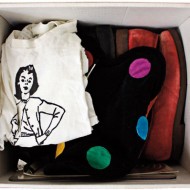 |
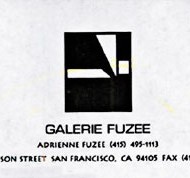 |
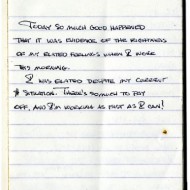 |
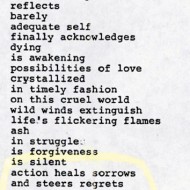 |
| Adrienne Fuzee Archive Box | Adrienne Fuzee Letterhead | Adrienne Fuzee Notebook | Poem by Adrienne Fuzee |
- Migrating Archives: Participating Archives
- Adarna Food and Culture Restaurant
- The Australian Lesbian and Gay Archives
- The Fonds Suzan Daniel
- GALA
- Gay, Lesbian, Bisexual Transgender Historical Society
- Glasgow Women’s Library
- Hall-Carpenter Archives
- Il Cassero and Centro di Documentazione
- Labrisz Lesbian Association
- The Leslie Lohman Museum
- The National Archives
- rukus!
- Virginia Commonwealth University Libraries

